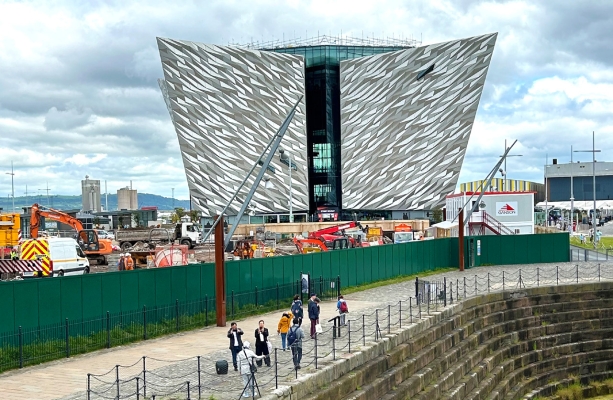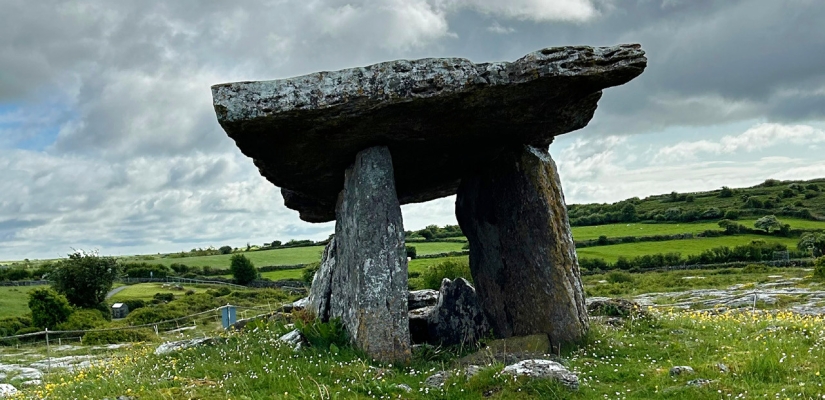Thoughts from Travel in Ireland
 Jeff Winter and Sally Brown-Winter exploring the beautiful Cliffs of Moher in the Burren region of Ireland
Jeff Winter and Sally Brown-Winter exploring the beautiful Cliffs of Moher in the Burren region of Ireland
September, 2024
This past May, my wife and I embarked on a two week visit to Ireland. While unlike many other tourists from America, we didn't do so to "discover" our Irish roots (we don't have any), but rather we had an agenda which included exploration of the countryside, culture, and several aspects of the lived Jewish experience.
Our first week was with an organized, guided hiking trip on the west coast, which we shared with a group of eight people including a very well-informed guide, an Irish woman who we felt in many ways captured the local spirit. On our various and varied excursions, she shared a great deal about Irish history, geography, flora and fauna, and much more. Seeing the small towns and countryside was a great way to get a feel of the country, the conditions which figure in to the rich culture and history and spend outdoor time enjoying the various micro-climates of the land. The second week we arranged on our own, and split our time between Belfast and Dublin. We took walking tours, went to museums, talked with quite a few people, and of course spent our evenings in some of the many lively pubs in the area. Amazingly, we had no daytime rain.
There are four items from the trip which have a notably Jewish dimension.
Item #1 was deepening our understanding of the history of the Jewish experience in Ireland. I began before the trip by reading a number of books on Irish history which included information on the Jewish experience. In-country, we learned more through conversations and a visit to the Jewish Museum of Dublin. I went to Ireland knowing that while Jews have lived there for many centuries, in general they have not been warmly embraced. Many would agree that it's never been a great home for our people. Perhaps this can be seen as ironic since the Irish people have endured such a long and complicated history of oppression and victimhood from England and the Catholic Church. Unfortunately, there are relatively few examples of Jews being made to feel welcome. Of course there are some notable exceptions, such as the great success and prominence of the Herzog family which produced a Chief Rabbi and President of Israel, and several well-respected mayors and other political leaders. Nevertheless, Ireland has not been seen to embrace its Jewish population. In fact, there have been many more times of fear, exclusion, and outright anti-Semitism. In today's world it's clear that there is strong Irish identification with Gazans and Palestinians, and the few local Jews we spoke to have seen outright hostility towards Israel, and in some cases anti-Semitic acts towards individual Jews and institutions. While in Dublin we learned that the number of synagogues there declined from a high of nine to only one operating shul at this point- meaning of course there's no option for telling the time-worn Jewish joke about having the shul you wouldn't step foot in! While Dublin has Ireland's largest Jewish community, fewer than 1,000 Jews live in the country.
It is particularly sad to note that there was little help given to Jews before, during, or after the Holocaust, and to their great embarrassment, their President in 1945, Douglas Hyde sent condolences to Germany over the death of Hitler. What can we say to that? There's no way to escape the fact that Ireland is not a great friend of Israel or the Jews, but sometimes we choose to visit places in order to build bridges of understanding and to learn about different aspects of the culture.
Item #2:When my wife and I travel across country or internationally, we always plan ahead to attend synagogues and Shabbat gatherings. On this trip we went to the Dublin Chabad House, which was an opportunity to interact with over 80 mostly young people who came for the very late starting dinner due to the timing of the sunset in Ireland. Before and during the dinner, we spoke with many attendees including several Israelis who were working for hi-tech companies. Now because of Brexit, Ireland is the only English-speaking country in the EU, and they are in their words "eating England's lunch" and loving it. We heard this multiple times while there. It was demoralizing however to learn from the Israeli hi-tech workers that they planned to leave the country as soon as they could because of feeling unsafe. One woman who lives in Dublin told us she had to withdraw her children from the local elementary school because of anti-Semitism. She now drives them a great distance every day to a Jewish day school. On the other hand, the Chabad rabbi and rebbetzin are active in local affairs and do what they can to educate and be welcoming.
Item #3. Most nights we visited pubs and restaurants for a meal and to hear some of the lovely Irish music we so enjoy. In fact, there is such an abundance of beauty in Ireland – the charming small towns, the rich and verdant countryside, the exciting culture, and many opportunities to learn about the dynamic leaders of yesterday and opportunities for the future. The lovely and welcoming people were friendly everywhere we went. Ireland has an abundance to celebrate, even with their painful history of large-scale emigration, brutal famine, and forced assimilation. Given all of that, it's perhaps ironic that the Irish don't identify closely with the Jewish experience although there is so much we have in common. The Irish have endured and prevailed, keeping a spirit and ancient language alive and the beating heart of their peoplehood which can be seen and heard in their music, literature, culture, and celebrations. I am reminded how one evening in Belfast, when Sally and I were looking for a place to sit in a pub, a young lady noticed us and came over to help. She said, "let me find you some chairs" and proceeded to sit near us and tell us that she comes here because this was the only "Catholic" pub in the area. I asked her if she would date a Protestant boy, and she said she might but "her family certainly wouldn't approve." I told her that I was Jewish, and the Catholic/Protestant conflict didn't really hit home with me. She quickly remarked, "that's ok, you've got enough troubles of your own!"
Item #4: In Belfast we visited the amazing Museum of the Titanic which is without question one of the most impressive museums I've ever seen. The Titanic was built in the exact location of the museum and there are immersive exhibits (no pun intended) which must be seen to appreciate. Following that visit, we had arranged for a tour with the Paddy Campbell Black Cab company to see the sites of the so called "troubles" from the 1960's and 70's. The private tour was given by a man who told us right off the bat that this tour would be given through his personal perspective, and he didn't pretend to be objective. He had served seven hard years in prison for his activities with the IRA and he told us some very troubling anecdotes about his experiences. When the guide took us to a prominent poster display area in which we saw that much of that space had been taken over with pro-Palestinian propaganda. I told him how I felt that this demeaned the legacy of those who sacrificed so much for Irish rights and how it overshadowed the message that he and others hoped to convey about their struggle. He said that it was a neighborhood choice, and it would be taken down at some point. I hoped that my response and conversation with him made an impression and let him know that Irish identification with Palestinian cause brings with it baggage which may perhaps be sending a message they aren't fully considering.
In conclusion, it's interesting to note that we often learn from our sacred texts that much had to be done to create community for the Jewish people throughout history. Our holidays, rituals, history, and lived experiences are all part of how we understand our past, the possibilities of the future, and deal with challenges of today. Like the Jews, the Irish have endured brutal struggles and horrors but even as millions have starved and emigrated, they continue to live productive, positive lives in the land they consider their legacy and their heritage. Like the Irish, we also have long memories, and we commemorate and keep alive the lessons and wisdom of the past. Like the Irish, we have had to overcome great odds, continue to teach ancient traditions and find ways to make our history important to future generations.
I believe we share vital and important lessons that are sometimes painfully learned and become long embedded in our hearts and minds. I hope that in some small way, Sally and I were able to build some bridges and understand one another a wee bit better.
I'll conclude with one of my favorite Irish toasts: May the wind always be at your back, may the sunshine always warm your face, and may the rains fall softly upon your fields.









Comments 1
Jeff Winter:
Enjoyed your December2024 article about your trip to Ireland. My late wife and I took a 2-week trip to Ireland and Northern Ireland in October 2005. It was very enjoyable, and of course that was before the Irish have freely adopted and spewed blood libels by Hamas without regard to the atrocities perpetrated against the Jews of Israel.
Just one anecdote. I am a fan of the poetry of William Butler Yeats. We managed to find his grave on our way to Galloway, about 6:00 p.m. There was an Irish couple also standing by his grave. I recited Yeats' poem "The Second Coming" In its entirety from memory. When I was done, the Irishman's eyes were wide open, and he exclaimed, "My God, You're an American!" With hindsight, I wish that I had added, "yes, and a Jew."